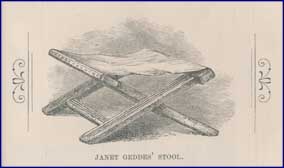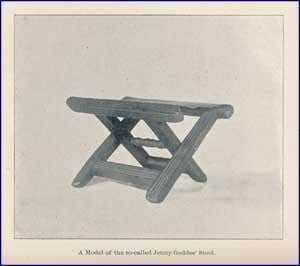The Day of Small Beginnings
Drawing from three separate quotations, we have in short compass the story of Jenny Geddes and her little wooden stool, which God used to bring about a revolution and a return to biblical truth.
* * *
 Two years ago, while walking about in Old St. Giles’ church in Edinburgh, with Dr. W. G. Blaikie, whose fame as author, scholar, and preacher, is known throughout the Presbyterian Church, he said, ― this is the first time I have been here in seventeen years. And yet this is the church in which Knox preached and Jennie Geddes worshipped. Here she threw the famous stool at the head of the Dean who was reading the liturgy, under orders from King Charles. The outburst of popular indignation, occasioned by this act, was the beginning of the great struggle for religious liberty in Scotland.
Two years ago, while walking about in Old St. Giles’ church in Edinburgh, with Dr. W. G. Blaikie, whose fame as author, scholar, and preacher, is known throughout the Presbyterian Church, he said, ― this is the first time I have been here in seventeen years. And yet this is the church in which Knox preached and Jennie Geddes worshipped. Here she threw the famous stool at the head of the Dean who was reading the liturgy, under orders from King Charles. The outburst of popular indignation, occasioned by this act, was the beginning of the great struggle for religious liberty in Scotland.
* * *
The war in behalf of purity in religion began in Scotland. Archbishop William Laud [1573-1645] prepared a new Prayer-book and sent it to Edinburgh for the use of the churches. On July 23, 1637, the priest of St. Giles Church came forth in white surplice to read the new ritual. Jennie Geddes flung her stool at his head, and a riot drove the minister from the chancel. All Scotland arose in arms against Laud’s innovations, and in 1638 the National Covenant was signed, binding the Scottish people to labor for the purity and liberty of the gospel. In the same year, at Glasgow, the General Assembly of the Church of Scotland deposed the bishops and re-established the Presbyterian system.
Two brief wars with Scotland were waged by King Charles, but the lack of money compelled him to summon the representatives of the people. The combatants stood face to face in the arena of debate. The issues of religious and of civil liberty were at length to be decided in a conflict between Charles Stuart and the English Parliament.
* * *
 It has been said, and not without a show of propriety, “that the First Reformation in Scotland was commenced by a stone cast from the hand of a boy, and the Second Reformation by a stool from the hand of a woman.” By causes in themselves so insignificant does God often produce the grandest results. Detach them from their connections, and they are nothing. Associate them with the other links in the chain of providential influence to which they belong, and they become mighty for good or for evil. The bite of a spider has caused the death of a monarch, and the monarch’s death a revolution in his empire.
It has been said, and not without a show of propriety, “that the First Reformation in Scotland was commenced by a stone cast from the hand of a boy, and the Second Reformation by a stool from the hand of a woman.” By causes in themselves so insignificant does God often produce the grandest results. Detach them from their connections, and they are nothing. Associate them with the other links in the chain of providential influence to which they belong, and they become mighty for good or for evil. The bite of a spider has caused the death of a monarch, and the monarch’s death a revolution in his empire.
* * *
Words to Live By:
The Lord delights to use the weak things of this world to accomplish His purposes.
For consider your calling, brethren, that there were not many wise according to the flesh, not many mighty, not many noble; but God has chosen the foolish things of the world to shame the wise, and God has chosen the weak things of the world to shame the things which are strong, and the base things of the world and the despised God has chosen, the things that are not, so that He may nullify the things that are, so that no man may boast before God. (1 Corinthians 1:26-29, NASB)
Elsewhere on the Web today, PCA pastor George Grant shared this poem by J.S. Blackie. Thank you, George. I did not previously know of this poem.
The Song of Jenny Geddes by J.S. Blackie
‘Twas the twenty-third of July, in the sixteen thirty-seven,
On the Sabbath morn from high St. Giles the solemn peal was given;
King Charles had sworn that Scottish men should pray by printed rule;
He sent a book, but never dreamt of danger from a stool.
The Council and the Judges, with ermined pomp elate,
The Provost and the Bailies in gold and crimson state,
Fair silken-vested ladies, grave doctors of the school,
Were there to please the King, and learn the virtues of a stool.
The Bishop and the Dean came in wi’ muckle gravity,
Right smooth and sleek, but lordly pride was lurking in their e’e;
Their full lawn sleeves were blown and big, like seals in briny pool;
They bore a book, but little thought they soon should feel a stool.
The Dean he to the alter went, and, with a solemn look,
He cast his eyes to heaven, and read the curious-printed book:
In Jenny’s heart the blood upwelled with bitter anguish full;
Sudden she started to her legs, and stoutly grasped the stool!
As when a mountain wildcat springs upon a rabbit small,
So Jenny on the Dean springs, with gush of holy gall;
Wilt thou say mass at my lugs, thou popish-puling fool?
No! No! She said, and at his head she flung the three-legged stool.
A bump, a thump! A smash, a crash! Now gentle folks beware!
Stool after stool, like rattling hail, came twirling through the air,
With, well done, Jenny! Bravo, Jenny! That’s the proper tool!
When the Devil will out, and shows his snout, just meet him with a stool!
The Council and the Judges were smitten with strange fear,
The ladies and the Bailies their seats did deftly clear,
The Bishop and the Dean went in sorrow and in dool,
And all the Popish flummery fled when Jenny showed the stool!
And thus a mighty deed was done by Jenny’s valiant hand,
Black Prelacy and Popery she drove from Scottish land;
King Charles he was a shuffling knave, priest Laud a meddling fool,
But Jenny was a woman wise, who beat them with a stool!
